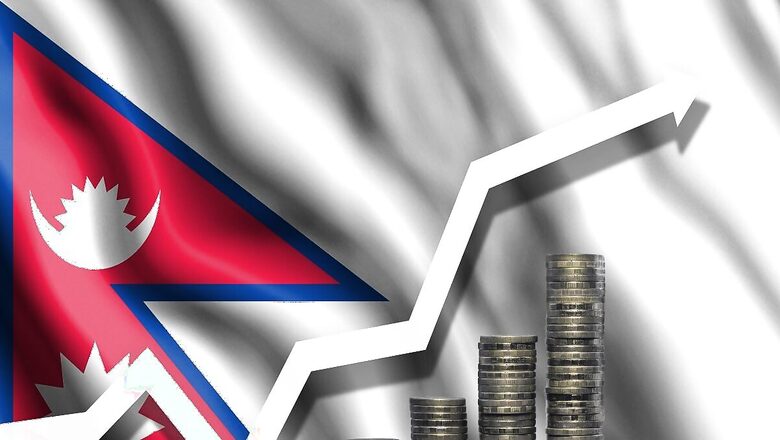
views
“Nothing else in the world…not all the armies…is so powerful as an idea whose time has come,” often cited words of wisdom from French writer Victor Hugo are particularly relevant for Nepal, today, when it surely needs to accept an idea whose time has come and that is the spirit of economic reforms. Not as a corollary, but it would be worthwhile for the policymakers at the helm in Kathmandu to look back at India of 1991 and the then finance minister Dr Manmohan Singh’s much-celebrated reference of Victor Hugo’s quote before changing the course of majorly state-controlled Indian economy with ushering economic liberalisation plan. Going beyond the words of wisdom, what sacrosanct is to identify the common reasons back then in India or now in Nepal, are the ‘structural flaws’ and ‘cyclical decline’.
Unimaginable losses which Nepal suffered with Covid-19, despite the challenges, can also be attributed to the recessionary tendency in Nepal’s economy that made the decision-makers in both the government and industry jittery. In all probability, the downturn shall pass as the economy is on the path of rebounding, despite the negative growth in the last two quarters. As per a PTI report, Nepal’s economy has, of late, shown signs of improvement after shock absorption and attained 2.16 percent growth (source: National Statistics Office, Nepal) overcoming the worst. However, moving forward, what would be vital are the responses on the policy front, especially the readiness to reform rather than stopping it.
Noticeably, Nepal entered into an economic recession for the first time in the last six decades with falling economic output emanated by demand shock, liquidity crunch, balance of payment crisis, high inflation and policy paralysis. As far as NSO’s latest projection is concerned, it keeps the Gross Domestic Product (GDP) growth in tune with 1.9 percent in 2022-23. In the budget, it was estimated to be 8 percent. As usual, multilateral institutions too failed in projecting a figure close by. NSO estimated it on the basis of economic fundamentals of the period (July 2022-April 2023) and assumed economic activities would remain normal and the economy would get traction in the final quarter of this fiscal year. While Nepal’s economy is in a rebounding phase despite the challenges, NSO’s estimate may get wrong if the industrial output and capital spending are not on course as they are expected to be.
Nepal’s real developmental dilemma lies in its low propensity to reform while keeping the monopolistic structure in key productive sectors, notwithstanding the promises made by the transition from a monarchy to a functional democracy, its economy is neither handled well by the state nor private enterprises. A sad truth remains that Nepal has the pursuit for getting foreign investments but without opening its economy for fair competition (even if not the perfect one) and ushering market reforms. Another fault line is having its front-running industries showing no signs of recognising the export potential and recalibrating their capacity to make Nepal a hub of hope rather than despair. Among the policymakers, a realisation should be that Nepal has no backup of a command economy to support a few major enterprises, and next, the aspirations of people can’t wait for things to get in order with nature’s command and control.
To get the system in order, it would be imperative to have a consensus on making a long-term economic vision for Nepal. This will be made possible by giving an alternative development paradigm to Nepal and recognising the need of a fine balance in having the government and industry work in tandem despite the frequency of changes in political order. To know the evolution and working of a political order, it would be helpful to quote the political scientist Francis Fukuyama who recognised the centrality of three institutions for explaining it: the state, the rule of law and mechanisms of accountability. Kathmandu and provincial elites helming the political might should recognise the merit of ‘accountability’, ‘home works’ and ‘rule of law’, they should work for a political economy where the state will act like a facilitator for inclusive economic development. This too is an idea whose time has come.
Going beyond the jargon, there is glaring urgency to identify the bottlenecks in Nepal’s economy and act promptly:
- Weak infrastructure base with shortcomings in planning and implementation: A few examples are the road projects that have been planned in fancy rather in response to the requirements. Nepal certainly doesn’t need 8-lane roads and with a completion phase as long as over a decade. The infrastructure projects have to be sustainable and thus ensuring transparency and efficiency is the need of hour.
- Wasted energy potential: While it was supposed to illuminate the home and the world, with just a production capacity of 2500 megawatt hydroelectricity and no avenues to sustain its export to India, mainly for offering low cost-advantage and cyclical inability to meet the demand at home turf, Nepal is missing to explore the actual benefits. Nepal should brand its hydroelectricity as “green energy”, augment its production, and increase the consumption at home (with more uses of electric vehicles and other appliances) and keep the export to India unwaveringly. This will be a game changer if the course-correction is made at this front.
- Sectoral reforms: The key sectors (including telecom, banking and financial services (with focus on making a rational payment arrangement), agriculture & food processing, IT & ITeS; FMCG, Aviation) should be opened for competition where the existing players should compete with new entrants and let the end consumers benefited out of it.
- Abolishing monopolistic tendency and promoting fair competition: This will be possible with the state’s participation in the transformative process of reforms as a facilitator and with a welfaristic touch.
- Safe and improved connectivity: On its own and through the developmental partnerships, Nepal should particularly make the road and air connectivity safe and improved. Its infrastructure should have a welcoming preparedness.
- Enhancing tourism potential: Nepal’s main source of revenue should be boosted with improved connectivity. Needless to say, the whole world is looking at Nepal as a major tourism destination, it is endowed with natural and civilisational richness and there is no reason tourism should not be treated as a major industrial sector.
- Climate change and mitigation: As a country uniquely positioned with the top peaks of Himalayas, huge water reservoirs and an open border with India, Nepal has all the reasons to come forward and play a major role to mitigate climate change. In doing so, it will create a strong basis of sustainability and finally help its economy in many ways possible.
- Checking outbound migration and decreasing reliance on remittance: While remittance contributes to about 22 percent of Nepal’s GDP, it comes at the cost of immense human suffering and long-term socio-economic losses. The upward mobility can’t be stopped but large masses going to far flung destinations for the sake of survival can be absorbed with gainful employment in the country if Nepal comes out of self-imposed economic woes.
- Improving transparency and removing corruption: Doing it will help in restoring the confidence of the private sector in the country and also help in getting foreign investments.
- Recognising the virtue of ‘home work’ rather than ‘external influence’: As a sovereign country and with a firmly established democracy, Nepal should act at home turf for putting things in order. Beyond a point, there is no reason to cite ‘external influence’ as a factor that really harms Nepal’s prospects. It should be dealt much more effectively.
Nepal will not go the Sri Lanka way. If it acts for making the state much more responsible for inclusive growth and usher into a wave of progressive economic reforms, it has a chance to come out stronger after the downturn. Some of the long-pending actions will transpire the wishful changes ahead for Nepal, and India as a friendly neighbour, can certainly be a partner of such a metamorphosis.
Atul K Thakur is policy professional, columnist and writer with a special focus on South Asia. The views expressed are personal.



















Comments
0 comment